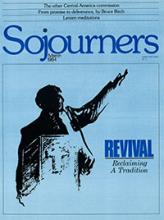I am no longer my own, but thine. Put me to what thou wilt, rank me with whom thou wilt; put me to doing, put me to suffering; let me be employed for thee, exalted for thee or brought low for thee; let me be full, let me be empty; let me have all things, let me have nothing; I freely and heartily yield all things to thy pleasure and disposal.
And now O God ... thou art mine and I am thine. So be it. And the covenant which I have made on earth, let it be ratified in heaven. Amen.
—Prayer from John Wesley's Service for Such as Would Enter or Renew their Covenant With God
I am an adopted child of John Wesley. My upbringing was in a parsonage family of the Evangelical United Brethren Church (EUB). When we merged with the Methodists late in my high school years, I took little note—even though my Dad was busily involved in the local administrative negotiations. But in seminary a friend who was at once my mentor in Scripture and civil disobedience drove me to those roots. He said, "To know where you're going, you need to know where you're coming from." Duly prompted, I took a course on Wesley to find out and recognized with an EUB heart my spiritual kith and kin. Indeed, yet another mentor emerged with whom I pray to be in covenant.
Read the Full Article

